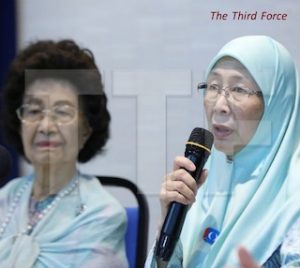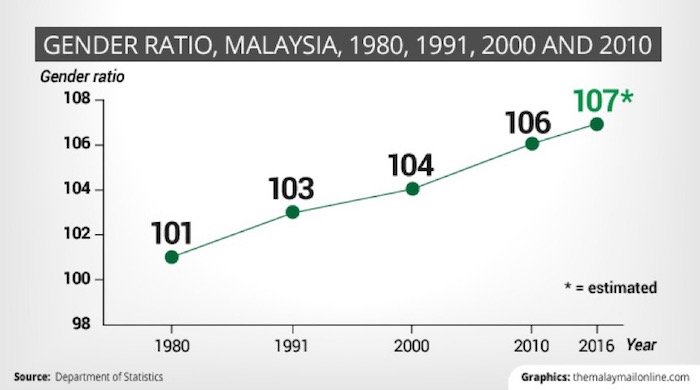
TTF: The woman sitting next to Datin Seri Dr Wan Azizah Wan Ismail is Siti Hasmah, wife of former premier Dr Mahathir Mohamad. Mahathir led government for 22 years, while Dato’ Seri Najib Tun Razak is only into his 9th year. So, to be fair, let us compare the number of Ministers and Deputy Ministers Mahathir introduced during the first six years of his watch with the number Najib brought to the fore up until 2015:
List of Women Ministers from 1981 – 1987 under Mahathir (repeat occurrences omitted)
1. Aisha Ghani (Minister of General Welfare) – 1981
2. Rafidah Aziz (Minister of Public Enterprises) – 1981
3. Napsiah Omar (Minister of Public Enterprises) – 1987
Total: 3
List of Women Ministers from 2009 – 2015 under Najib (repeat occurrences omitted)
1. Ng Yen Yen (Minister of Tourism) – 2009
2. Shahrizat Abdul Jalil (Minister of Women, Family and Community Development) – 2009
3. Nancy Shukri (Minister in the Prime Minister’s Department) – 2013
4. Rohani Abdul Karim (Minister of Women, Family and Community Development) – 2013
5. Azalina Othman Said (Minister in the Prime Minister’s Department) – 2015
Total: 5
List of Women Deputy Ministers from 1981 – 1987 under Mahathir (repeat occurrences omitted)
1. Napsiah Omar (Deputy Minister of Housing and Local Government) – 1982
2. Rahmah Othman (Deputy Minister of Information) – 1982
3. Rosemary Chow Poh Kheng (Deputy Minister of Culture, Youth and Sports) – 1982
4. Shariffah Dorah Syed Mohammed (Deputy Minister in the Prime Minister’s Department) – 1982
5. Siti Zaharah Sulaiman (Deputy Minister in the Prime Minister’s Department) – 1986
6. Tong Gaik Kwan (Deputy Minister of Youth and Sports) – 1987
7. Zaleha Ismail (Deputy Minister of Transport) – 1987
Total: 7
List of Women Ministers from 2009 – 2015 under Najib (repeat occurrences omitted)
1. Chew Mei Fun (Deputy Minister of Women, Family and Community Development) – 2009
2. Heng Seai Kie (Deputy Minister of Information, Communications, Arts and Culture) – 2009
3. Mashitah Ibrahim (Deputy Minister in the Prime Minister’s Department) – 2009
4. Maznah Mazlan (Deputy Minister of Human Resources) – 2009
5. Norah Kasnon (Deputy Minister of Energy, Green Technology and Water) – 2009
6. Rohani Abdul Karim (Deputy Minister of Agriculture and Agro-based Industry) – 2009
7. Rosnah Abdul Rashid Shirlin (Deputy Minister of Health) – 2009
8. Tan Lian Hoe (Deputy Minister of Domestic Trade and Consumer Affairs) – 2009
9. Azizah Mohd Dun (Deputy Minister of Women, Family and Community Development) – 2013
10. Halimah Mohamed Sadique (Deputy Minister of Urban Wellbeing, Housing and Local Government) – 2013
11. Mary Yap Kian Ching (Deputy Minister of Education) – 2013
12. Mas Ermieyati Samsudin (Deputy Minister of Tourism and Culture) – 2015
Total: 12
The gender ratios for the said periods are as below:

Clearly, the rate of gender-ratio increase during the first six years under Mahathir’s watch exceeded that under Najib’s watch. But just to eliminate the rate increase from being factored, we’ll assume that the rates under both administrations were the same.
Under the circumstances, the total number of women introduced to key ministerial positions in government by both Mahathir and Najib in the first six years of their respective watches are as follows:
Mahathir: 10 women
Najib: 17 women
Percentage increase under Najib: 70%
Does that not show that Najib places far more emphasis on women’s contribution to nation building than Mahathir does? So how are we to believe that things will change should Mahathir return post-GE14 as Prime Minister of Malaysia.
Just because Wan Azizah sat next to his wife?
*********************************
PETALING JAYA: Women should be better represented in local politics, according to Pakatan Harapan (PH) president Datuk Seri Dr Wan Azizah Wan Ismail without offering concrete measures towards this.
Pointing out that nearly half the 14.8 million registered voters were women, she said during a press conference today that the group could easily determine the winners of the general election.
“Women’s role in nation building must be reform and such we must democratise the political system so that more female leaders would come forward,” she said as she sat beside Tun Dr Siti Hasmah Ali, the wife to Tun Dr Mahathir Mohamad.
When asked what the two did to further this cause when they had been the wives of the prime minister and deputy prime minister, they said they could not at the time as they were obliged to be apolitical.
“However, both Wan Azizah and I were able to help empower women through Bakti when we were members,” Siti Hasmah said, referring to the Welfare Association of Wives of Ministers and Deputy Ministers.
When it was apparent that was the extent of her answer, PKR vice-president Chua Tian Chang, or Tian Chua, stepped in to say Dr Mahathir’s industrialisation policies as prime minister increased employment among women especially in the rural area.
“They were employed and thus empowered working in these industries; however, now it is not just matter of being employed but having more say in politics,” he said.
When asked what specifically was preventing women from entering politics, Chua said it was a universal issue but did not venture further.
Earlier, PH Wanita chief Zuraida Kamaruddin said the dearth made it impossible for the pact to deliver on its pledge to field female candidates in a third of the seats they will contest in the general election.
“Regrettably we are not able to achieve our target. However, we are grooming more women to do so, but it is an ongoing process which takes time,” she said.
PH also pledged today to create a new account class with the Employees Provident Fund (EPF) for homemakers, in which housewives would receive 2 per cent from their husbands’ contributions.
Source: The Malay Mail Online



